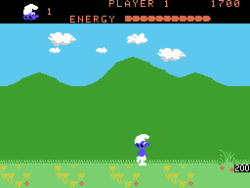Smurf: Rescue in Gargamel's Castle
| Smurf: Rescue in Gargamel's Castle | |
|---|---|
 In Smurf: Rescue in Gargamel's Castle, even stumbling over a few weeds can be fatal. | |
| Developer(s) | Coleco |
| Publisher(s) | Coleco |
| Platform(s) | Atari 2600, ColecoVision |
| Release date(s) |
(Atari 2600)[1]
(ColecoVision)[2] |
| Genre(s) | Platform |
| Mode(s) | Single-player |
Smurf: Rescue in Gargamel's Castle is a 1982 video game published and developed by Coleco for the ColecoVision and Atari 2600. The game is based on the television series, The Smurfs. In the game, the player must brave a series of obstacles to rescue Smurfette from Gargamel's castle. An Intellivision version was planned but never developed or released.
Gameplay
Gargamel has kidnapped Smurfette. As a Smurf, the player has to walk from the Smurf village through a forest and a cave on the way to Gargamel's castle, where Smurfette awaits rescue. The player has an energy bar that slowly depletes over time.
Each side-scrolling screen presents various obstacles that the player must precisely jump over (e.g. fences, stalagmites) or land upon (e.g. ledges). Failure to execute any jump results in instant death. Higher difficulty levels introduce flying bats and spiders that the player must also avoid.
The ColecoVision version of Smurf: Rescue in Gargamel's Castle contains Easter eggs - initials may appear onscreen when moving between screens, and the player will receive hundreds of thousands of points, when moving between two forest screens.[3]
Two of the background music tracks are Simple Gifts and the first movement of Ludwig Van Beethoven's 6th Symphony, the "Pastoral".
Reception
Smurf was reviewed in Video magazine in its "Arcade Alley" column where it was praised as utilizing "the best audiovisuals in the entire [ColecoVision] line". The visuals were described as "what amounts to the video-game equivalent of a Saturday-morning cartoon show", and the audio was described as "sophisticated" with nuanced sounds such as ominous organ music and the "muted echo" accompaniment to standard leaps. The reviewers also cautioned players to "prepare for frustration" until they learned how to accurately judge leaps.[4] The game was given the award for "Best Video Game Audiovisual Effects" at the 4th annual Arkie Awards.[5]
References
- ↑ "Release date (Atari 2600)". Game FAQs. Retrieved 2008-08-28.
- ↑ "Release date (ColecoVision)". Game FAQs. Retrieved 2008-08-28.
- ↑ The Game Doctor (June 1983). "Q&A". Electronic Games. p. 112. Retrieved 7 January 2015.
- ↑ Kunkel, Bill; Katz, Arnie (January 1983). "Arcade Alley: Smurf & Ladybug from ColecoVision". Video. Reese Communications. 6 (10): 50, 122. ISSN 0147-8907.
- ↑ Kunkel, Bill; Katz, Arnie (February 1983). "Arcade Alley: The Fourth Annual Arcade Awards". Video. Reese Communications. 6 (11): 30, 108. ISSN 0147-8907.
External links
- Smurf: Rescue in Gargamel's Castle at MobyGames
- Video demonstration of Smurf: Rescue in Gargamel's Castle
- The Atari 2600 version of Smurf: Rescue in Gargamel's Castle can be played for free in the browser at the Internet Archive